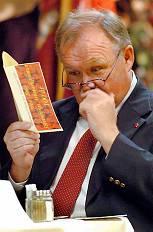Persson was born in Vingker in Sdermanland, Sweden, in a working-class home. He has in recent years revealed that he wanted to become a priest as a young man; however, he applied to the college in rebro where he took courses in social science. He completed 80 college credits in the subject before he gave them up in 1971 without graduating. According to himself he had at the time almost completed an education in social and political sciences, something that has never been verified since he was never registered at the faculty of political science. As the college later received credentials as a full university, the renamed rebro University gave him an honorary PhD in medicine in February of 2005, an award that has provoked some controversy and bribery claims.
In December 6, 2003 Persson married Anitra Steen, who was his third wife. He first married Gunnel (Claesson) in 1978 with whom he had two daughters. They divorced in 1995, and on March 10 of the same year he remarried Annika Barthine whom he divorced in December 2002.
He has maintained his Christian belief and in contrast to many other Social Democratic leaders he has underlined his faith on several occasions. In a debate between the political leaders broadcasted live by TV4 in 2006 he expressed how he shared a strong commitment to the Church with the Christian Democratic leader Gran Hgglund.
Political career
Persson has been in office for more than ten years, and is about to become the second longest continuously governing prime minister of Sweden, exceeded only by Tage Erlander. He is known for his oratorical prowess, often dispensing with prepared speeches or preparing them without the aid of his staff. This has been a useful talent since his career has periodically been lined with immense criticism, scandals, accusations of dictatorial rule, and concentration of power. He has had to face shocking incidents, such as the murder of the minister of foreign affairs, Anna Lindh, in 2003, the tsunami disaster in 2004, and the Gothenburg riots in 2001.
During the spring of 2001 he lead the European Union as Sweden held the chairman position and welcomed US president George W Bush in Gothenburg; this was the first visit to Sweden by a US-president. As a reaction to the visit riots broke out in the streets of Gothenburg in some of the most violent clashes between police and protestors ever in Sweden. The events in Gothenburg in June 2001 are still a very sensitive subject and are subject to much dispute, read more at Protests during the EU summit in Gothenburg 2001.
In the early seventies he worked for the Swedish Social Democratic Youth League (SSU), and was a member of the national board from 1972 to 1975. Later, he served as a city council politician at the small municipality of Katrineholm. In 1979 he was elected Member of Parliament, but went back to local politics to serve as mayor (kommunalrd) of Katrineholm from 1985 to 1989. During his time as mayor of Katrineholm Persson he became notorious for his harsh leadership and was nicknamed HSB, an acronym for "He who rules."
In 1989 he was made Minister of Schools in the Ministry of Education during the first Ingvar Carlsson cabinet, until the election in 1991 when the Social Democrats were voted out of office. Persson was one of the brains behind the "Persson-plan" which was presented in 1994 targeting the prevailing economic situation. Sweden at the time still suffered from the recession which began during the early nineties, high unemployment rates and a huge budget deficit. Prime minister Carl Bildt relied at the time on a fragile coalition between the Moderate Party and three other liberal or conservative parties with a strained cooperativeness. The outcome of the 1994 election became a success for the Social Democrats gaining more than 45% of the votes.
Upon returning to government in 1994 Persson was made Minister of Finance, a post he held until 1996, when he succeeded Ingvar Carlsson as Prime Minister and party leader. As Minister of Finance much of his job was focused on attaining a sound financial balance in the economy. As a prime minister however, he didn't manage to become as popular as his precedor and in the 1998 election the Social Democrats gained even fewer votes than in the 1991 election when they got voted out of office. Much thanks to support from primarily the Green and Left parties, he managed to retain office but had to rely on support from at least two parties in the parliament. In the 2002 election the Social Democrats increased its number of seats in the parliament primarily on behalf of the Left Party. Persson continued to lead a minority government instead of forming a coalition, despite earlier demands from his supporting parties to participate in the government.But now its over.
